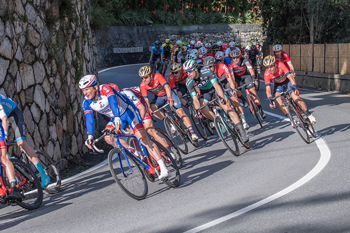Three weeks ago, on a gorgeous Saturday morning, my wife and I were five minutes into a bike ride when I got a call from the police. Before the officer even said why he had called, I knew what had happened — my son had been in a bike accident. My only question was how bad was bad?
On his regular Saturday ride with his cycling club, my son hit a large pine cone, was thrown over his handle bars like he was shot out of a cannon, and landed on his head. When his buddy circled back, he was unresponsive except for seizing and convulsing. The ambulance took him to the trauma unit of Stanford Hospital.
 |
The rider behind him ran over his bike, crashed, broke his shoulder, and needed surgery. It feels like a miracle that no one else was hurt out of a peloton of 30 to 40 riders.
My son had no broken bones, but he did suffer a severe concussion, and short term memory issues that are associated with concussions. He remembers nothing at all about the crash except waking up in the hospital. A week later he still felt unsteady or dizzy in response to sudden motion or changes in body position. Playing a favorite video game made him feel bad. Sleeping a lot felt good.
He had road rash all over — face, collar bone, hands, ribs, hip, bum, and a gash on his knee. He bit his tongue, and has an appointment with his orthodontist. He'll be on seizure medicine for the foreseeable future, and he can't drive for a month. He also missed a week of work.
Riding in the car together a week later, my son and I talked about a book I had just read by Steve Leder called More Beautiful Than Before; How Suffering Transforms Us (2017). Leder is the Senior Rabbi of Wilshire Boulevard Temple, the oldest Jewish congregation in Los Angeles, with roots that date back to 1851, and also one of the largest, with three campuses and 7,000 members. His book is a practical guide that draws upon his pastoral experiences of thirty years: "it's my phone that rings when people's bodies or lives fall apart."
"To be human is to suffer," writes Leder. I was reminded of this painful truth by my son's accident, and by two friends recently — one of whom is grieving the suicide of his son, the other who is struggling with his child's drug addictions.
Leder never glorifies suffering, as if any amount of pain is worth some lesson learned, and he knows full well that some people are destroyed by it. Nonetheless, it can also be true that "pain is an invitation to those of us who survive the suffering to become kinder, better people." In our brokenness we can become "more beautiful than before." And so when people ask Leder what he learned through his own health problems, he has a ready response: "it made me a kinder person."
Kindness is one of the gifts of the Spirit in Galatians 5. Compassion characterized the ministry and message of Jesus.
In Luke 7 we read how a large crowd thronged Jesus and his disciples. Luke uses the same Greek word to describe how when they entered the town gate, they met another large crowd that was leaving the village. It was a funeral procession, and they were leaving Nain because ritual purity prohibited burials inside the city walls. And so the two large crowds met at the town gate—the followers of Jesus going in and the mourners of Nain going out.
The corpse was "the only son of his mother," which meant that this woman faced double jeopardy. She had been a widow, and now she was childless. As if her fragile life wasn't hard enough, she fell further down the economic scale of protection and provision. All she had to live for and to live by were gone. Perhaps the "large crowd" that accompanied her was indicative of the depth of her tragedy.
When the two crowds met and Jesus encountered the widow, "his heart went out to her" in a spontaneous act of compassion. No one had asked him to do anything. No one had even recognized him. But the sights and sounds were too much for Jesus. Moved to compassion, he told her, "Don't cry." He then touched the coffin, raised the man to life, and "gave him back to his mother."
 |
Maybe it's because it has such a crazy spelling and pronunciation, but I still remember learning the verb "to have compassion" in Greek class forty years ago in seminary—splagcnizomai. The word occurs a dozen times in the New Testament, only in the gospels. The verb form comes from the noun splanxna, meaning your bowels, heart, lungs, liver or kidneys, which in that day were considered the center of human emotions. Throughout the Gospels Jesus is a man of compassion.
When he saw the crowds afflicted with sickness and disease, "he had compassion on them." When he saw the hungry, "he had compassion on them," healed the sick, and fed the five thousand. When thronged by another "large crowd" of the lame, the blind, the crippled, and the dumb, he told his disciples, "I have compassion for these people." And when he left Jericho followed by yet another "large crowd," and two blind beggars screamed for help, "Jesus had compassion on them" and healed them.
The two most famous parables in the Gospels are about compassion. While the prodigal son "was still a long way off, his father saw him and was filled with compassion for him." That's what God is like, says Luke. And in contrast to the insider religious professionals, the outsider Good Samaritan "had compassion" on the man who was beaten by thugs. Reflecting God's own character, that's what we should be like.
I'm not an unkind or uncaring person. But I could be more compassionate, more empathetic, and more attentive to what people around me are suffering. My son's bike crash has me thinking about the saying of the first century Jewish philosopher Philo of Alexandria: "Be kind to all, for everyone you meet is fighting a great battle."
Image credits: (1) Wikipedia.org and (2) Wikipedia.org.
NOTE: To support Journey with Jesus with a gift, please click here.



